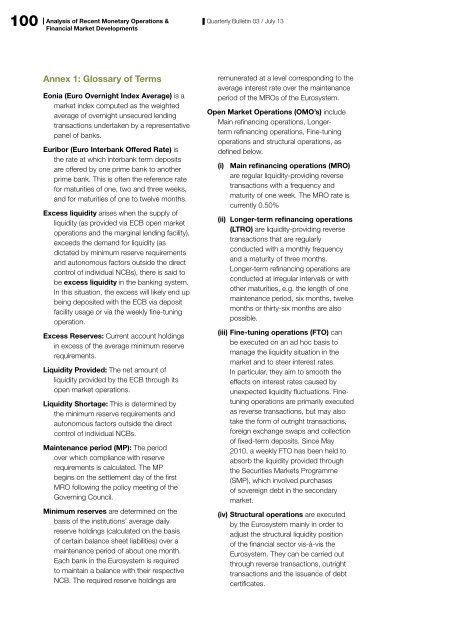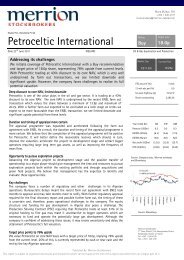Quarterly Bulletin Q3 2013
Quarterly Bulletin Q3 2013
Quarterly Bulletin Q3 2013
You also want an ePaper? Increase the reach of your titles
YUMPU automatically turns print PDFs into web optimized ePapers that Google loves.
100<br />
Analysis of Recent Monetary Operations &<br />
<strong>Quarterly</strong> <strong>Bulletin</strong> 03 / July 13<br />
Financial Market Developments<br />
Annex 1: Glossary of Terms<br />
Eonia (Euro Overnight Index Average) is a<br />
market index computed as the weighted<br />
average of overnight unsecured lending<br />
transactions undertaken by a representative<br />
panel of banks.<br />
Euribor (Euro Interbank Offered Rate) is<br />
the rate at which interbank term deposits<br />
are offered by one prime bank to another<br />
prime bank. This is often the reference rate<br />
for maturities of one, two and three weeks,<br />
and for maturities of one to twelve months.<br />
Excess liquidity arises when the supply of<br />
liquidity (as provided via ECB open market<br />
operations and the marginal lending facility),<br />
exceeds the demand for liquidity (as<br />
dictated by minimum reserve requirements<br />
and autonomous factors outside the direct<br />
control of individual NCBs), there is said to<br />
be excess liquidity in the banking system.<br />
In this situation, the excess will likely end up<br />
being deposited with the ECB via deposit<br />
facility usage or via the weekly fine-tuning<br />
operation.<br />
Excess Reserves: Current account holdings<br />
in excess of the average minimum reserve<br />
requirements.<br />
Liquidity Provided: The net amount of<br />
liquidity provided by the ECB through its<br />
open market operations.<br />
Liquidity Shortage: This is determined by<br />
the minimum reserve requirements and<br />
autonomous factors outside the direct<br />
control of individual NCBs.<br />
Maintenance period (MP): The period<br />
over which compliance with reserve<br />
requirements is calculated. The MP<br />
begins on the settlement day of the first<br />
MRO following the policy meeting of the<br />
Governing Council.<br />
Minimum reserves are determined on the<br />
basis of the institutions’ average daily<br />
reserve holdings (calculated on the basis<br />
of certain balance sheet liabilities) over a<br />
maintenance period of about one month.<br />
Each bank in the Eurosystem is required<br />
to maintain a balance with their respective<br />
NCB. The required reserve holdings are<br />
remunerated at a level corresponding to the<br />
average interest rate over the maintenance<br />
period of the MROs of the Eurosystem.<br />
Open Market Operations (OMO’s) include<br />
Main refinancing operations, Longerterm<br />
refinancing operations, Fine-tuning<br />
operations and structural operations, as<br />
defined below.<br />
(i) Main refinancing operations (MRO)<br />
are regular liquidity-providing reverse<br />
transactions with a frequency and<br />
maturity of one week. The MRO rate is<br />
currently 0.50%<br />
(ii) Longer-term refinancing operations<br />
(LTRO) are liquidity-providing reverse<br />
transactions that are regularly<br />
conducted with a monthly frequency<br />
and a maturity of three months.<br />
Longer-term refinancing operations are<br />
conducted at irregular intervals or with<br />
other maturities, e.g. the length of one<br />
maintenance period, six months, twelve<br />
months or thirty-six months are also<br />
possible.<br />
(iii) Fine-tuning operations (FTO) can<br />
be executed on an ad hoc basis to<br />
manage the liquidity situation in the<br />
market and to steer interest rates.<br />
In particular, they aim to smooth the<br />
effects on interest rates caused by<br />
unexpected liquidity fluctuations. Finetuning<br />
operations are primarily executed<br />
as reverse transactions, but may also<br />
take the form of outright transactions,<br />
foreign exchange swaps and collection<br />
of fixed-term deposits. Since May<br />
2010, a weekly FTO has been held to<br />
absorb the liquidity provided through<br />
the Securities Markets Programme<br />
(SMP), which involved purchases<br />
of sovereign debt in the secondary<br />
market.<br />
(iv) Structural operations are executed<br />
by the Eurosystem mainly in order to<br />
adjust the structural liquidity position<br />
of the financial sector vis-à-vis the<br />
Eurosystem. They can be carried out<br />
through reverse transactions, outright<br />
transactions and the issuance of debt<br />
certificates.




